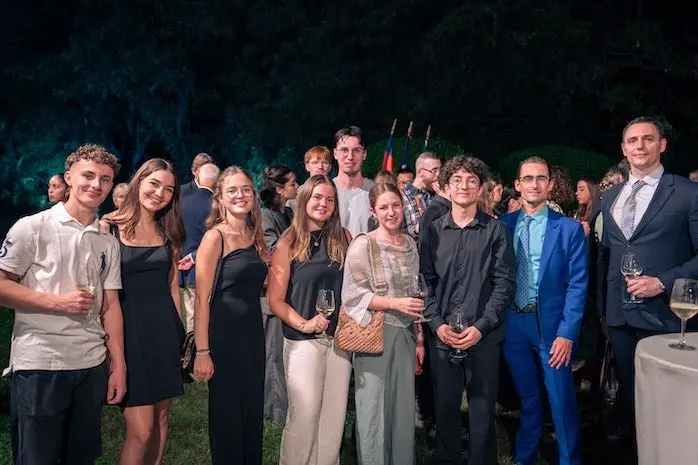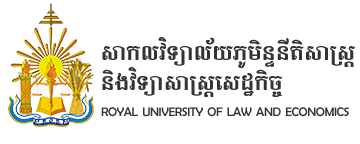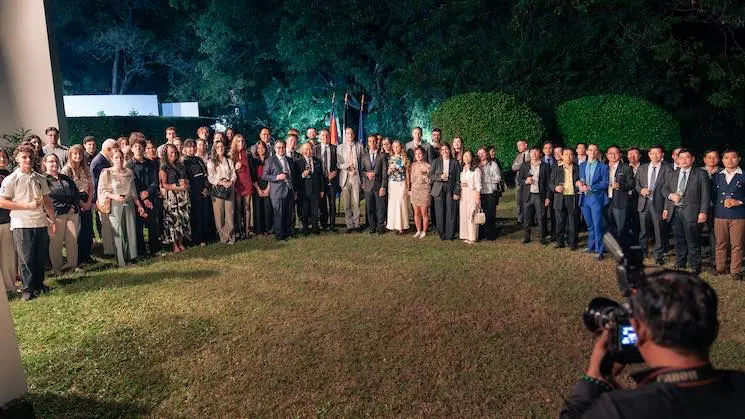It was also an opportunity to meet the French students enrolled at RULE. Indeed, while the heart of the French Cooperation Center’s efforts at the university remains focused on training Cambodian students to participate in economic development and the strengthening of the rule of law in Cambodia, it now also welcomes French students, who are increasingly numerous over the years and come to follow all or part of their academic curriculum there. No less than 70 French students have this year set foot on the RULE campus, while some sixty professors from French universities on mission come each year to share their knowledge with an audience now made up of 85% Cambodian students and 15% foreign students (mainly French, but also Turkish, Indian or even British). Cambodia and its public universities have therefore become a host country for French students who can also work or do an internship within a bustling ecosystem of businesses, law firms, international organizations or civil society.
Two French students shared their motivations and their joy in studying in Cambodia. Mathilde Lorant, a Master’s student in Euro-Asian trade and economic (Rennes university), and intern within an incubator, says she is happy to be able to exchange, debate and analyze in real time what is happening on the markets between Europe and Asia. “RULE is not just a faculty, it is a springboard to the international and a real learning ground for Euro-Asian exchanges,” she stressed. For her part, Marie Gegout, a Master 1 student in Franco-Asian business law (Paris Assas university), highlighted the added value of this Cambodian immersion by emphasizing the opportunity for French students to dialogue and think differently, by comparing legal systems, ways of working, and professional ambitions.
Also present this evening, Hugo Berrebi, a student in his 3rd year of bachelor’s degree in political science at Sciences Po Paris, chose to do a semester of school exchange at RULE followed by a semester of internship. “I was attracted by the country’s culture, its memorial history and its position in Southeast Asia, the region I was targeting. The courses taught by local professors on regional themes, often directly involved in the development of Cambodia at different scales, offer an enriching look at the country and the region,” he stressed.
This convivial ceremony highlighted the actions of Franco-Cambodian cooperation in the field of teaching human sciences, as well as honoring those who make it live daily, including the administrators and partners of the French Cooperation Center or the associate professors. Thanks to them, 11 Franco-Cambodian double degrees exist today. A symbol of recent reciprocity, RULE is therefore increasingly solicited by its European and French partners to sign exchange or delocalized diploma agreements. In this sense, H.E. Mr. Samedy Sivathana welcomed the presence of French students in the Franco-Cambodian curricula, who participate in “forming in Cambodian universities citizens of the world, who can then play their role as benevolent ambassadors of pacifist and innovative solutions“.
For his part, the French Ambassador to Cambodia hailed and reaffirmed his support for this historic and fruitful cooperation, which also aims to develop increasingly specialized diplomas to meet the demands of the Cambodian labor market and participate in the country’s economic development. “This cooperation has made it possible to train Cambodian elites who have been able to pursue Master’s or doctoral studies in France thanks to the various scholarship schemes granted by France. I would also like to highlight the remarkable careers of Cambodian alumni who now hold prestigious positions in the public and private sectors in Cambodia,” said H.E. Mr. Jacques Pellet. An enthusiasm shared by H.E. Mr. Samedy Sivathana: “I am delighted to celebrate the vitality of this cooperation which trains hundreds of young Cambodians each year in law, economics and management. This cooperation allows them to benefit from a double degree recognized internationally but also from opportunities for further studies and scholarships from the French government,” stressed the representative of the Minister of Education. The latter also pleads in favor of teaching French and in French in Cambodia, the French language constituting above all “the privileged means of access to in-depth knowledge of the history of Cambodia, of its culture and also of its society, for a better understanding of the challenges of development and the consolidation of peace”.


 ភាសាខ្មែរ
ភាសាខ្មែរ
